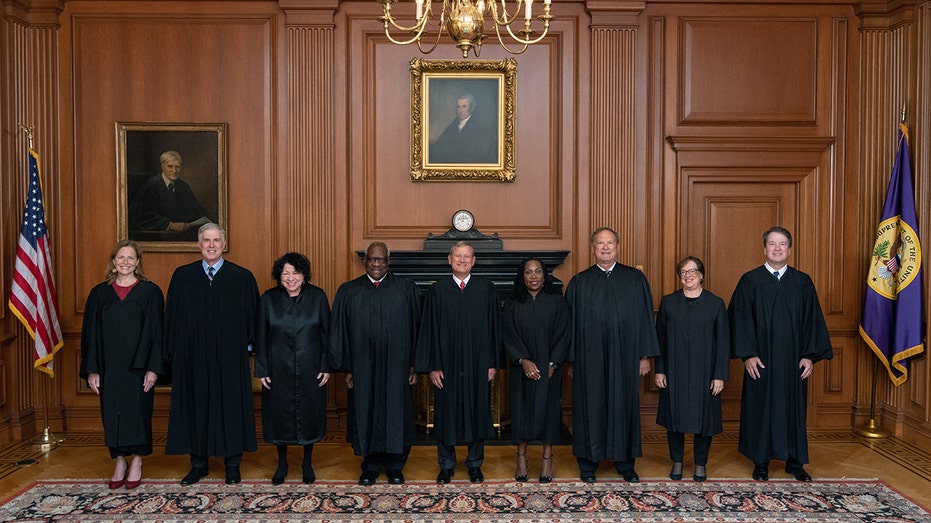Biden battles California in Supreme Court fight over how to bring home the bacon
California's Proposition 12 could cost producers and consumers up to $350 million, according to the National Pork Producers Council
The Biden administration and the state of California, normally steadfast allies on a range of environmental issues, will face off today in a Supreme Court case that will decide whether California has the right to impose tough animal-welfare standards on pork produced outside the state.
California’s Proposition 12, a ballot measure enacted by voters in 2018, imposed strict production standards for hog farmers and banned the in-state sale of any pork produced outside of those standards. The Justice Department argues the state ballot measure is unconstitutional because it violates the Dormant Commerce Clause, which prohibits one state from discriminating against another state’s commerce, or "impose undue burdens on interstate commerce."
DOJ's stance on Prop 12 puts it on the side of the two groups that filed the lawsuit, the National Pork Producers Council (NPPC) and the American Farm Bureau Federation. These groups say California residents consume 15% of the nation's pork products, and that nearly 99.9% of those products come from outside the state.
Forcing pork producers to follow California standards would give California the power to unfairly impose new costs on the industry and "transform the pork industry nationwide."
SUMMARIES OF HIGH-PROFILE SUPREME COURT CASES

Department of Justice, Washington, DC (iStock)
They also argue the California rule will add up to $350 million in new costs for producers and lead to higher consumer prices at a time of elevated inflation.
"California is attempting to set the rules for the entire country," Farm Bureau President Zippy Duvall said in a media statement. "Farmers are dedicated to caring for their animals, but this misguided law inhibits efforts to provide them a safe environment."
"This law has the potential to devastate small family farms across the nation through unnecessary and expensive renovations, and every family will ultimately pay for the law through higher food prices," he said.
SUPREME COURT TO HEAR CASE ON BIG TECH’S LEGAL IMMUNITY FROM CONTROVERSIAL CONTENT

A hog walks in a holding pen on the Ron Mardesen farm, Thursday, Dec. 2, 2021, near Elliott, Iowa. ((AP Photo/Charlie Neibergall) / AP Newsroom)
DOJ agrees that California "has regulated out-of-state activity in service of an interest that is not a legitimate basis for regulation under our federal system of sovereign States."
"The constitutional concern with impermissible extraterritorial regulation has its greatest force," in this case, DOJ stated.
California rejects arguments that its regulations are "impossible" to implement, and alleged in its brief that "a number of pork producers and suppliers have publicly announced that they have taken steps to ensure that their products will continue to be sold lawfully in California."
The state noted that Tyson Foods said the company "will not have difficulty ‘align[ing] suppliers’ to produce Proposition 12-compliant pork and pork for other States 'simultaneously.'"
TRUMP MAR-A-LAGO CASE LATEST TO LAND ON SUPREME COURT’S ‘SHADOW DOCKET’

On June 30, 2022, Justice Jackson took the oaths of office to become the 104th Associate Justice of the Supreme Court of the United States. (Collection of the Supreme Court of the United States via Getty Images / Getty Images)
Biden’s DOJ is also finding itself at odds with other Democrats, including Senator Corey Booker, D-N.J., who filed a California-friendly amicus brief with the court, and the Humane Society of the United States.
CLICK HERE TO GET THE FOX NEWS APP
"This case exemplifies the dangers associated with an expansive Dormant Commerce Clause doctrine," Booker said in his brief. "Petitioners would bypass Congress and the voting public, instead inviting the Court to engage in a fact-intensive analysis of the many economic and policy implications of California’s Proposition 12."
Oral argument for the case will get underway 10:00 a.m. on October 11.




















